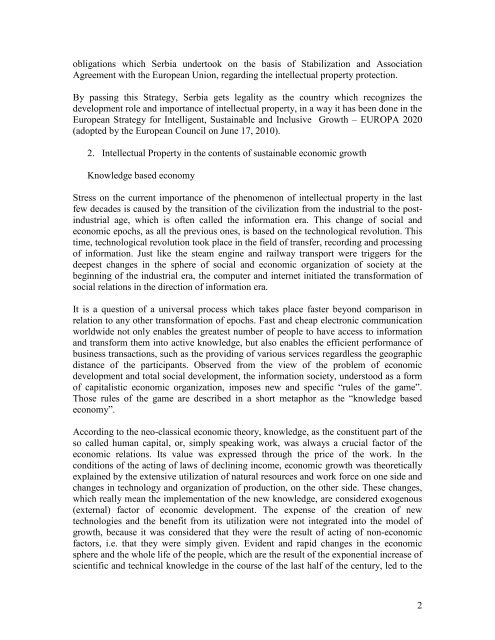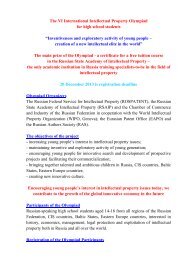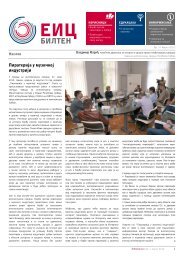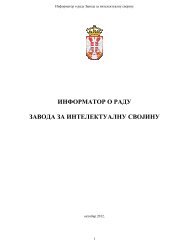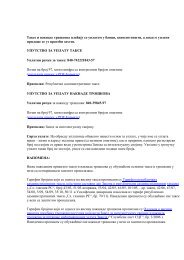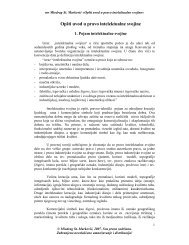Strategy of the intellectual property development for the period of ...
Strategy of the intellectual property development for the period of ...
Strategy of the intellectual property development for the period of ...
You also want an ePaper? Increase the reach of your titles
YUMPU automatically turns print PDFs into web optimized ePapers that Google loves.
obligations which Serbia undertook on <strong>the</strong> basis <strong>of</strong> Stabilization and AssociationAgreement with <strong>the</strong> European Union, regarding <strong>the</strong> <strong>intellectual</strong> <strong>property</strong> protection.By passing this <strong>Strategy</strong>, Serbia gets legality as <strong>the</strong> country which recognizes <strong>the</strong><strong>development</strong> role and importance <strong>of</strong> <strong>intellectual</strong> <strong>property</strong>, in a way it has been done in <strong>the</strong>European <strong>Strategy</strong> <strong>for</strong> Intelligent, Sustainable and Inclusive Growth – EUROPA 2020(adopted by <strong>the</strong> European Council on June 17, 2010).2. Intellectual Property in <strong>the</strong> contents <strong>of</strong> sustainable economic growthKnowledge based economyStress on <strong>the</strong> current importance <strong>of</strong> <strong>the</strong> phenomenon <strong>of</strong> <strong>intellectual</strong> <strong>property</strong> in <strong>the</strong> lastfew decades is caused by <strong>the</strong> transition <strong>of</strong> <strong>the</strong> civilization from <strong>the</strong> industrial to <strong>the</strong> postindustrialage, which is <strong>of</strong>ten called <strong>the</strong> in<strong>for</strong>mation era. This change <strong>of</strong> social andeconomic epochs, as all <strong>the</strong> previous ones, is based on <strong>the</strong> technological revolution. Thistime, technological revolution took place in <strong>the</strong> field <strong>of</strong> transfer, recording and processing<strong>of</strong> in<strong>for</strong>mation. Just like <strong>the</strong> steam engine and railway transport were triggers <strong>for</strong> <strong>the</strong>deepest changes in <strong>the</strong> sphere <strong>of</strong> social and economic organization <strong>of</strong> society at <strong>the</strong>beginning <strong>of</strong> <strong>the</strong> industrial era, <strong>the</strong> computer and internet initiated <strong>the</strong> trans<strong>for</strong>mation <strong>of</strong>social relations in <strong>the</strong> direction <strong>of</strong> in<strong>for</strong>mation era.It is a question <strong>of</strong> a universal process which takes place faster beyond comparison inrelation to any o<strong>the</strong>r trans<strong>for</strong>mation <strong>of</strong> epochs. Fast and cheap electronic communicationworldwide not only enables <strong>the</strong> greatest number <strong>of</strong> people to have access to in<strong>for</strong>mationand trans<strong>for</strong>m <strong>the</strong>m into active knowledge, but also enables <strong>the</strong> efficient per<strong>for</strong>mance <strong>of</strong>business transactions, such as <strong>the</strong> providing <strong>of</strong> various services regardless <strong>the</strong> geographicdistance <strong>of</strong> <strong>the</strong> participants. Observed from <strong>the</strong> view <strong>of</strong> <strong>the</strong> problem <strong>of</strong> economic<strong>development</strong> and total social <strong>development</strong>, <strong>the</strong> in<strong>for</strong>mation society, understood as a <strong>for</strong>m<strong>of</strong> capitalistic economic organization, imposes new and specific “rules <strong>of</strong> <strong>the</strong> game”.Those rules <strong>of</strong> <strong>the</strong> game are described in a short metaphor as <strong>the</strong> “knowledge basedeconomy”.According to <strong>the</strong> neo-classical economic <strong>the</strong>ory, knowledge, as <strong>the</strong> constituent part <strong>of</strong> <strong>the</strong>so called human capital, or, simply speaking work, was always a crucial factor <strong>of</strong> <strong>the</strong>economic relations. Its value was expressed through <strong>the</strong> price <strong>of</strong> <strong>the</strong> work. In <strong>the</strong>conditions <strong>of</strong> <strong>the</strong> acting <strong>of</strong> laws <strong>of</strong> declining income, economic growth was <strong>the</strong>oreticallyexplained by <strong>the</strong> extensive utilization <strong>of</strong> natural resources and work <strong>for</strong>ce on one side andchanges in technology and organization <strong>of</strong> production, on <strong>the</strong> o<strong>the</strong>r side. These changes,which really mean <strong>the</strong> implementation <strong>of</strong> <strong>the</strong> new knowledge, are considered exogenous(external) factor <strong>of</strong> economic <strong>development</strong>. The expense <strong>of</strong> <strong>the</strong> creation <strong>of</strong> newtechnologies and <strong>the</strong> benefit from its utilization were not integrated into <strong>the</strong> model <strong>of</strong>growth, because it was considered that <strong>the</strong>y were <strong>the</strong> result <strong>of</strong> acting <strong>of</strong> non-economicfactors, i.e. that <strong>the</strong>y were simply given. Evident and rapid changes in <strong>the</strong> economicsphere and <strong>the</strong> whole life <strong>of</strong> <strong>the</strong> people, which are <strong>the</strong> result <strong>of</strong> <strong>the</strong> exponential increase <strong>of</strong>scientific and technical knowledge in <strong>the</strong> course <strong>of</strong> <strong>the</strong> last half <strong>of</strong> <strong>the</strong> century, led to <strong>the</strong>2


